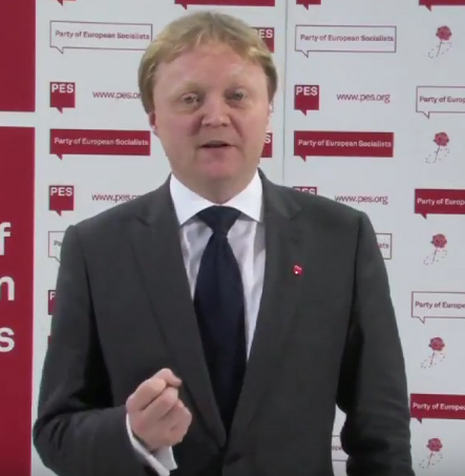Lord Wood of Anfield: ‘The House of Lords is imperfect, but it does have a lot of expertise’
Felix Peckham talks pay ratios, patronage and President Trump with Labour’s former Shadow Minister without Portfolio and current Chair of the UN Association UK

An effusive intellect, evidenced in his degrees from Oxford and Harvard, Lord Stewart Wood of Anfield is a former advisor to Gordon Brown and Ed Miliband, and lists one of his achievements as being part of the Treasury team that recommended that the British government didn’t join the Eurozone. Currently, he is Chair of the United Nations Association UK, in addition to his role as a Labour life peer in the House of Lords.
Sitting on a bench outside the Fisher Building at St John’s College, with the majestic grey stone of the old section of the college on one side, and the brutalist architecture of a far more modern addition on our other side, we talk politics. First up: the perennial question a self-identifying Labour politician must answer – do you support Jeremy Corbyn?
“I didn’t vote for Jeremy Corbyn either time,” Lord Wood tells me. “I’m probably more sympathetic towards some of what he’s doing than a lot of my colleagues are, because he’s not very popular in the Parliamentary Labour Party – that’s no secret,” he smiles. “I think Labour needs to make a break from the New Labour years. In that sense, I understand why Corbyn got elected. I think on the economy he is saying a lot of sensible things, but I don’t think he’s a leader who is going to win and I’d like to see him articulate a better vision about where Labour wants to take the country, but I’m sympathetic to some of what he does.”
“It is remarkable that in a modern democracy you have people in the House of Lords because of patronage from 800 years ago”
Lord Wood’s repetition of the word ‘sympathetic’ is a courteous description in relation to a political party that is suffering from the apparent loss of its core electoral constituency, inner-party turmoil over what stance to take on Brexit, and disobedience of a three-line whip, in addition to frequent resignations. On this cheerful note, we talk about Corbyn’s wage ratio proposal, introduced in true Labour pandemonium-style by being partially rescinded, reshaped and redesigned over the course of approximately 24 hours.
“I think a wage cap would basically just induce an entire industry of avoidance. I don’t see why a wage cap should deprive the public of tax revenue,” he argues, pointing out that “one of the good things about people earning a lot of money is that they pay a lot of tax.” So, he continues, it would be “crazy to stop that. But I do think we should have much more transparency about top pay, pay ratios and particularly large FTSE companies.”
We mull over the controversy over how much tax some of the highest earners actually pay, and whether we really want a flimsy sense of societal cohesion based merely on tax receipts.
“There’s lots and lots of things you can do about that without a wage cap,” Lord Wood interjects, “that are much more effective and that we don’t do, but we should do. You can change the tax treatment of bonuses and you can tax bonuses in lots of different ways.”
Moving on, Lord Wood tells me that “personally I think our second chamber should be elected. The reason the Lords isn’t reformed, usually, is because the House of Commons doesn’t want an elected second chamber because it makes its supremacy threatened.” Yet he is optimistic: “I hope that in my lifetime that will change. It is remarkable that in a modern democracy you have people there because of patronage from 800 years ago. It’s a bit weird.”
Despite Lord Wood’s favouring of constitutional reform, he is convinced that the House of Lords must still play a role in Brexit, noting that “the House of Lords is imperfect, but it does have a lot of expertise.” Indeed, he is adamant that it would be “crazy that the biggest decision that our country has made since the Second World War, which I think it is, doesn’t get scrutinised properly by Parliament and the House of Lords. I think it would be wrong for the House of Lords to do anything that reverses the referendum.”
“That will to hold firm with international law and the institutions that guard it and protect it is weak”
That said, he is quick to emphasise that the direction which the country takes after Brexit must be planned with care, noting he does not believe “that Brexit should mean we become ‘Singapore on steroids’, as someone once said. The nightmare for me is that we just slash taxes, slash workers’ conditions, slash regulation. There has to be an alternative to that.”
And, finally, Lord Wood assesses the threat that Donald Trump poses to international diplomacy, particularly following his phone dispute with the Australian Prime Minister, which Lord Wood, laughing, describes as “a cracker”.
“We definitely have cause to be concerned,” he says. “The whole idea of an international system based on rules is what is at stake. When it is being tested usually, it is the resolve of the leaders of the big countries that you rely on to hold the line. And, at the moment, with Donald Trump, with Putin, the Chinese and elsewhere, that will to hold firm with international law and the institutions that guard it and protect it is weak and that is a real threat to us. On issues like climate change, trade, the economy, we need stronger, not weaker, international institutions.”
On Theresa May’s approach to the new President, Lord Wood assures me he is “disappointed”, particularly because “she went beyond the professional relationship that a Prime Minister should have with the presidency and to make it an issue of personal chemistry, and I think she is going to pay the price for that.” He grimaces as he observes, “that hand-holding photo will come back to haunt her.”
In a more conciliatory tone, Lord Wood acknowledges that the Prime Minister “did say some pretty hard truths to [Trump],” as they talked about the importance of the UN and NATO. And he is also mischievously pragmatic about Trump’s controversial visit to the UK: while not supporting a state visit, he smiles as he tells me he thinks it would be “good [if] he visits, partly because I would like to be one of the people protesting against him”
 News / Uni commits to partial arms divestment after year-long review20 October 2025
News / Uni commits to partial arms divestment after year-long review20 October 2025 Arts / Why Cambridge’s architecture never lives up to the ‘dark academia’ dream 17 October 2025
Arts / Why Cambridge’s architecture never lives up to the ‘dark academia’ dream 17 October 2025 Lifestyle / My third year bucket list17 October 2025
Lifestyle / My third year bucket list17 October 2025 News / How much does your college master earn?17 October 2025
News / How much does your college master earn?17 October 2025 Comment / Nathan Cofnas shouldn’t be silenced 20 October 2025
Comment / Nathan Cofnas shouldn’t be silenced 20 October 2025









